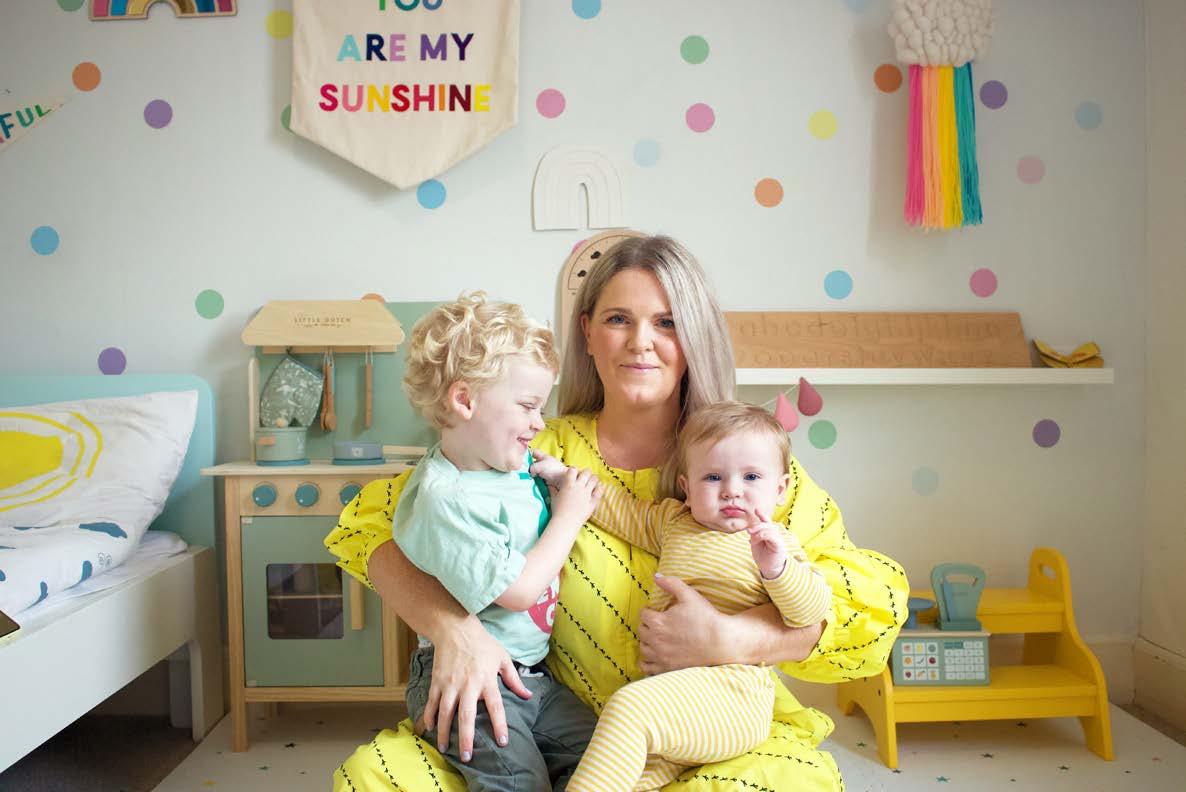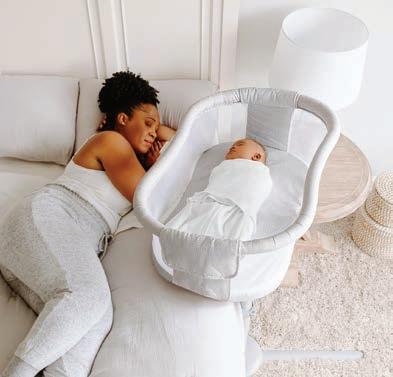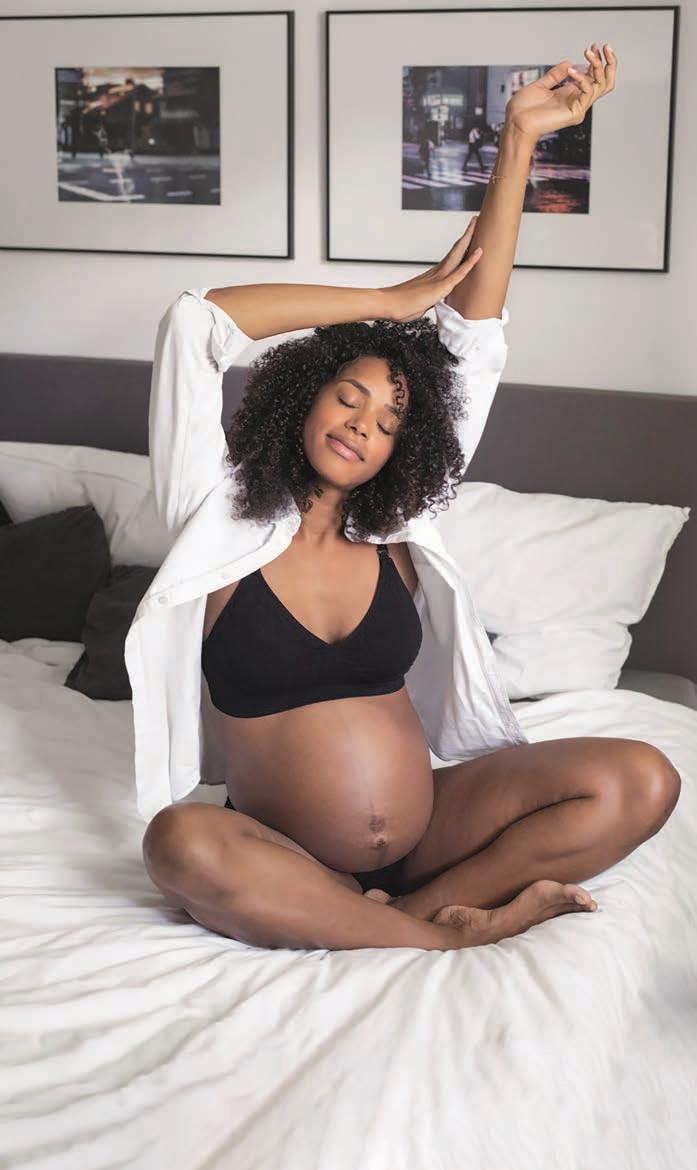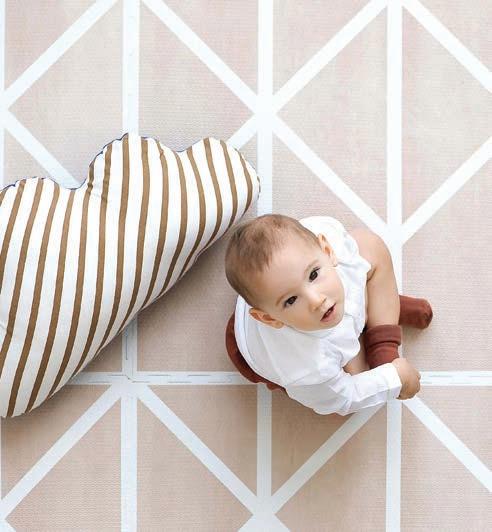
13 minute read
Time For Change
Tekie Quaye, mama-of-one and founder of BornTogether on the harmful effects of history, unconscious bias and racism on Black mothers...
Interview CARLY GLENDINNING
Q Could you tell us a little bit about BornTogether and how your own birthing experience made you want to work with pregnant and birthing people?
A BornTogether is something that I really hadn’t expected. When I gave birth to my daughter, in that moment I too was born, as a mother. This is the sentiment behind the name BornTogether. It was definitely my own birth experience and that of motherhood that energised me to begin this platform. I had worked hard in preparing for my birth. I was so excited not only to meet my baby but also to experience birth. I came into my pregnancy from a state of depression and have to be honest and say that I didn’t start to enjoy my pregnancy until the very end. I had no idea the shift that was about to occur in my life and within myself. My birth was far from the one I had been striving towards, and while I was sorely disappointed to have missed out on my home birth, it was the way I was treated
by medical professionals that fractured the confidence I held in my body and baby, alongside the distress, lack of autonomy and feeling of safety that changed the course of my birth and left me feeling traumatised. I think that I was so very lucky that the feelings I held around my birth, the deep sadness, feelings of shame and regret weren’t able to reach the way I was able to connect and be with my daughter. From the first moment, I have completely adored her. Becoming a mother has been the greatest journey of self-reflection, healing and forgiveness and while I will always be sad about the birth we had together, I have done a lot of work to no longer be ruled by the emotions. All of this, and the surprising community I discovered within motherhood, have worked its way into BornTogether.
Q You’ve written a lot about the harmful role of colonisation and the way enslaved women were expected to bear children for the profit of their masters. How does this inform the way that Black mothers are perceived and treated in birth today?
A I think one of the most troubling consequences of this is actually the impact and way Black mothers and parents come to view and understand their own selves and experiences. The experience of our ancestors comes to bear on our own, whether that is because we feel the weight of history, we want to break away and define our own story or are influenced by the way we have been valued over the course of history.
That having been said, the way our society and intuitions fail to recognise the way the products of this history, the culture and its understandings, still dominate the climate of care received by Black birthing persons is so toxic. The harmful role of colonisation is still at play within our institutions. While it may not be in the form of enslaved women giving birth to enslaved children for their masters, we see it in the continued distortion of knowledge, in the structures
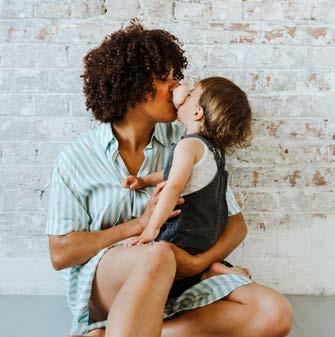
of power that determine who’s knowledge is privileged, that denies the centering of other cultural experiences, traditions and laws. Without exposing and acknowledging where the knowledge we hold as truth has come from and for what purpose that science was generated the education received by medical professionals within western intuitions will never change or challenge colonial ideology. Race science and racial stereotypes that are accepted as fact within contemporary medicine are rooted in this colonial ideology. In relation to Black birth, a short example would be in situations where Black birthing persons are denied pain relief because medical professionals operate on the belief that Black bodies don’t feel pain the same way as white bodies do. Black women are five times more likely to die in birth than their white counterparts here in the UK, more likely to miscarry, to deliver preterm, stillborn and babies born with low birth weights.
They will go for longer with conditions such as endometriosis without diagnosis and treatment. A direct consequence of the belief that endometriosis was a disease confined almost exclusively to white women. We need to be researching the direct impact colonialism has on today’s management of Black bodies and birth, the influence and impact of racism and unconscious bias. To move away from placing the onus or fault in the hands of Black parents and bodies, to o er up more than simple band aid solutions such as providing continuity of care to Black birthing persons as remedy to these outcomes. It is time for us, as Black birthing persons, to have greater sovereignty, autonomy, knowledge, regard for our birthing rights and right to choice in the landscape of birth and maternal care.
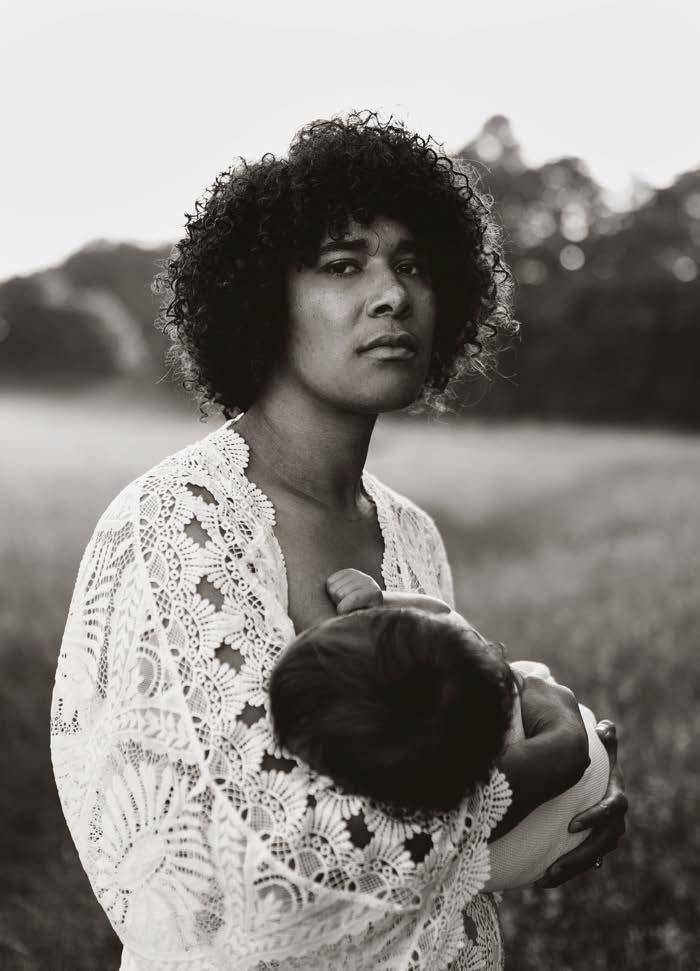
Q You have also spoken about the term ‘Weathering’, coined by Dr. Arline Geronimus. How does the toxic stress that ethnic minority mothers experience through unconscious bias and racism relate to their physical and mental health and ultimately poor maternal outcomes?
A Simply put it erodes our bodies. A consequence of living a life in a sustained state of fight or flight, for Black persons and others viewed as minorities. Battling stressors that are chronic and repeated (as defined by the concept of Weathering) is that our bodies are unable to carry this, they begin to deteriorate, impacting our general health and increasing our health vulnerability. The concept of Weathering transcends ideas that have dominated the conversation around poorer health outcomes within Black communities, that place the onus on the Black individuals for their unhealthy life choices and immutable genetic di erences.
When looking at how the concept of Weathering is relevant in relation to maternal outcomes it is important also to note the way its impact is heightened for Black women and birthing persons due to the “double jeopardy” of their gender and racial discrimination. It defies socioeconomic factors and levels of education. I remember reading how Black mothers with the highest levels of education are dying at rates higher than white women with lesser education. A Black woman with an advanced degree is still more likely to lose her baby than a white woman with less than an eighth-grade education.
It is a situation akin to the perfect storm. You have the cumulative e ects of racism and bias that erodes the body, you then become pregnant which places a great stress on a body that isn’t able to function at its optimum due to its being Weathered, you have the double jeopardy factor and then you have a health care system, an institution who continue to base their understanding of the Black body on colonial markers, to ignore conditions such as Weathering, to provide a lesser care and space for sovereignty and autonomy. This is the environment and context that surrounds the space for Black birthing persons.
There is also the issue of stereotypes coming into play, that of the angry Black woman, so people feel less able to speak up, you have the idea of the strong Black woman which influences birthing persons and professionals to believe pain can be felt di erently. If your birthing partner is a Black man it can be harder to strongly advocate for your partner without things escalating. I know Black parents who have experienced traumatic births at the hand of health care professionals and during consecutive births hold great concern about returning into the health care system. This places the parent and their baby at risk if they don’t feel safe to access health care.
There are so many factors that branch
from and intersect with birth and the concept of Weathering but I also want to highlight that the number of deaths, that sound very high when we talk about Black mothers being five times more likely to die, is a small percentage of birthing persons. I say this not to diminish the injustice, loss of life, family and future represented in this statistic but to help give even weight to the situation and hopefully reduce the fear and trauma that I know I felt when I first came to know of this when I was eight months pregnant.
Q The reality that BAME mother’s bodies are still treated as ‘vessels’ is deeply disturbing. What can you do to advocate for yourself during pregnancy and birth if you are not being listened to/respected/or you feel that you are being put in danger?
A The most important thing I would say is to know that you have options, without this understanding you will be limited. It isn’t possible to know all of your options but knowing you have the right to decline any treatment, to request time, to look for other sources of information opens doors.
You also have the right to request a di erent care provider if you feel that you are not being heard or receiving the appropriate care. If there is something that you don’t understand or hasn’t been made clear, you or ideally your birthing partner, should ask for clarification. You need to know what is happening in order to give true consent. Don’t be afraid to speak up, to escalate or seek secondary opinions!
Also you should insist that they put it in your notes if they are refusing to provide you with the care you are requesting.
It can be hard to advocate for yourself within the experience of birth, it removes

you from the part of the brain that allows for your natural hormones to assist. If you can have someone with you who can advocate for you if required this is also a measure you can take to fortify yourself. Education is also key, for yourself and also your birth partner, they can be there as part of the experience, but also to protect your space if needed.
I would also say that it is important to accept, before, during and after your birth that you will do the best for yourself and baby with the options you understand you have and the way you feel at the time. Not to feel disappointed in yourself, feel that you weren’t able to advocate hard enough for yourself in the moment. If this is the case you probably weren’t given the space to make a true choice.
Q It is clear that large scale change needs to happen and that although it is important for Black mothers to make their voices heard, the onus to implement this is not put on individuals but rather on the systems that are failing them. Do you have any thoughts on how the world can hold the system to account?
A I think it is important to note that currently, much of the onus is being placed upon Black birthing persons. The lifestyles and supposed vulnerabilities and inherent risk of Black bodies upheld as primary contributing factors.
We need to begin dismantling and decolonising our maternity systems. This means exposing, acknowledging and accepting the ways our knowledge has been derived and how colonialism is everywhere. It is cultural, economic, and political, it’s educational and psychological. We need to be looking to provide and make accessible culturally safe birthing spaces for Black mothers and parents to be.
I think that one of the biggest issues is the lack of understanding, of the factors sustaining this situation and the benefits to we would reap as a society if we are able to lift the care, experiences and outcomes for Black birthing persons and our babies. Sadly, I think it takes showing some people how they can benefit in order for change to happen.
I think that change and accountability will have to come with re-education of the care providers, where they can learn the failings of their own education and show them how it can be di erent, how they can be allies and advocates and hold space for Black birthing persons. It will take all of us to bring down an institution that has lasted this long, is this insidious and far reaching. It cannot be a task allocated to Black persons alone, we need all voices to lift our own, to stand behind us in support and ally ship.
@born__together borntogether.co.uk
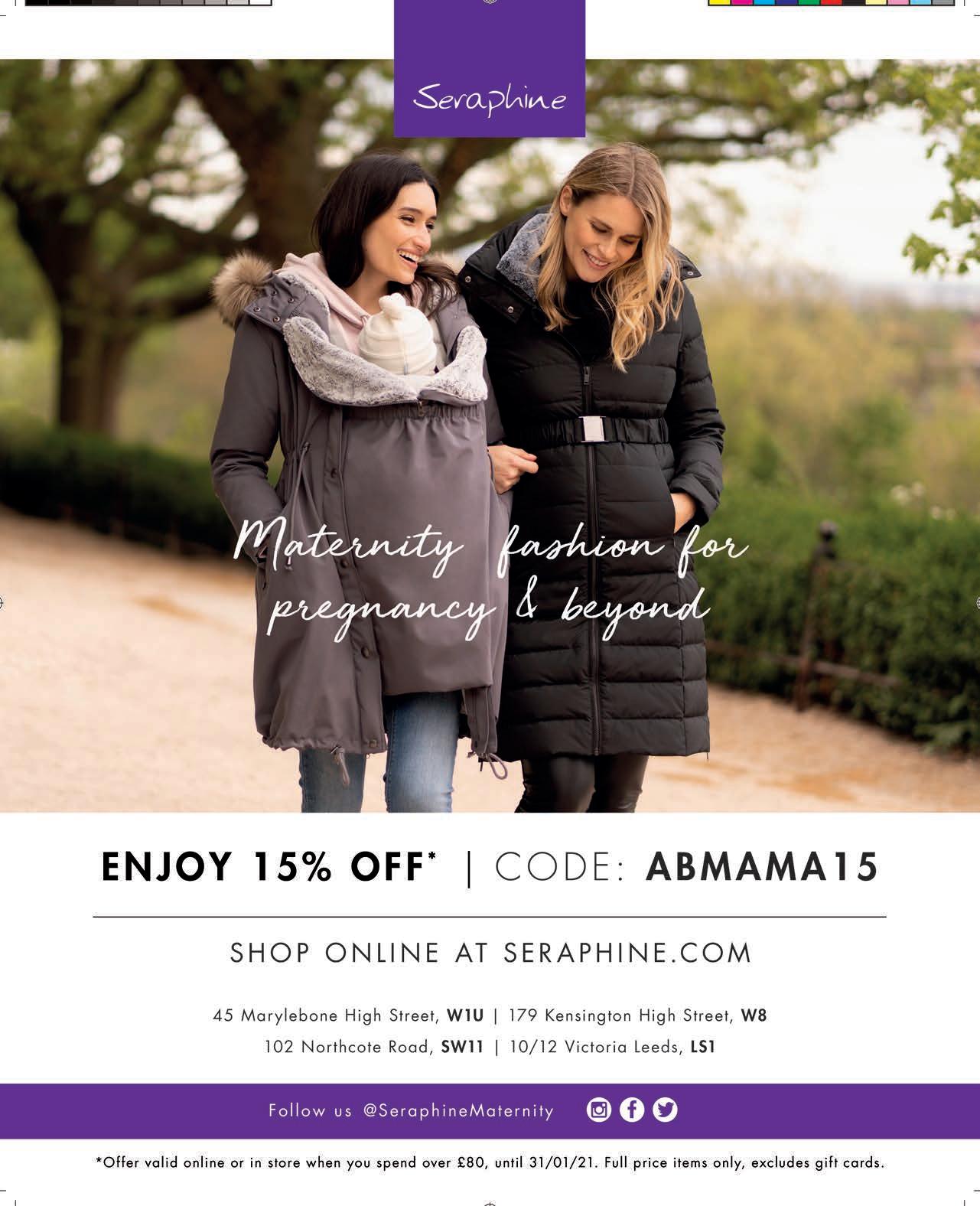
AUTUMN STYLE FOR MAMAS p.44 THE BEST NEW LOOKS FOR LITTLE ONES p.48
On the Outside

REIMA Finnish brand Reima is known for their practical outerwear for active little ones. Perfect for the change in the weather, their colourful and cosy coats are made using ecofriendly and ethical materials. reima.com
STYLE NOTES The month’s best styles, collaborations and collections
we love love CLASSIC COOL
KATE SHERIDAN Kate Sheridan celebrates British manufacturing British manufacturing with designs that balance with designs that balance classic craft with a modern classic craft with a modern aesthetic. The east London aesthetic. The east London designer’s pieces are made designer’s pieces are made to last generations.
katesheridan.com
GOING ECO
CATTO CATTO Hand-cra ed by the talented Armenian artisans of Istanbul, London-based brand CATTO CATTO’s current collection of accessories uses recycled sustainable vegan leather instead of calfskin. Taking recycling to the next level, the range also makes use of beads and D rings from abandoned furniture and broken antiques.
cattocatto.com

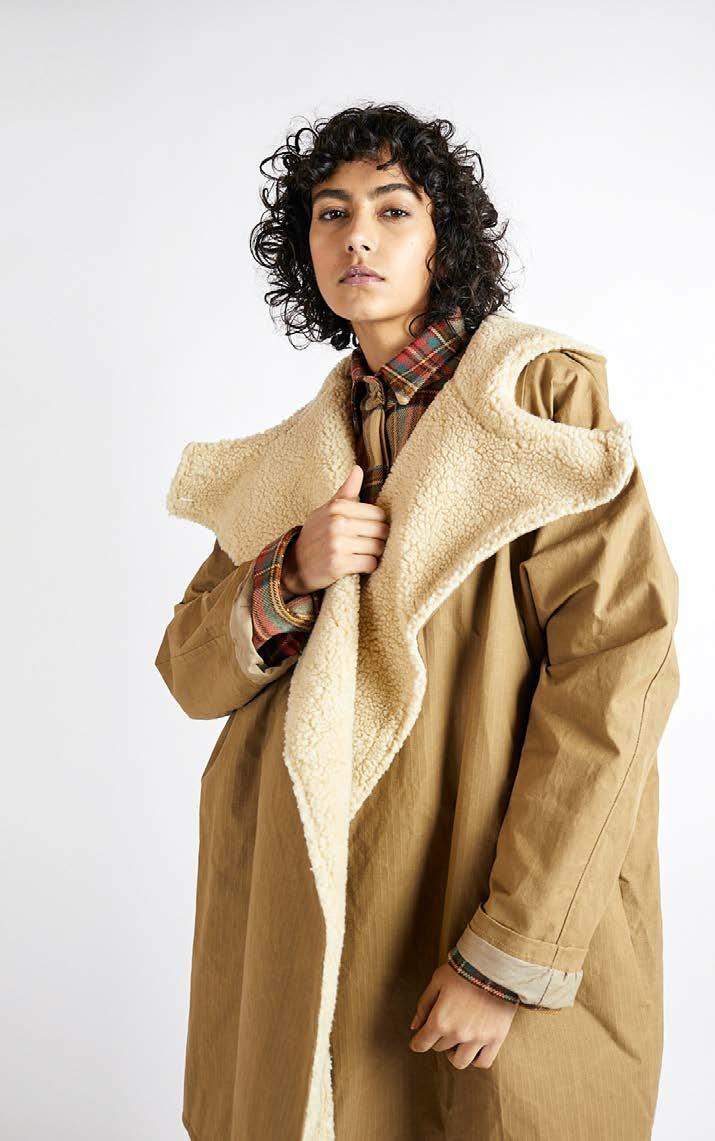
Rainbow Bright
ISABELLA OLIVER Sustainable maternity brand Isabella Oliver has teamed up with Great Ormond Street to create a knitted rainbow sweatshirt design aptly named ‘Hope’. 50% of the net proceeds from sales will be donated to the children’s charity, supporting the hospital’s most urgent needs.
isabellaoliver.com
Feet First
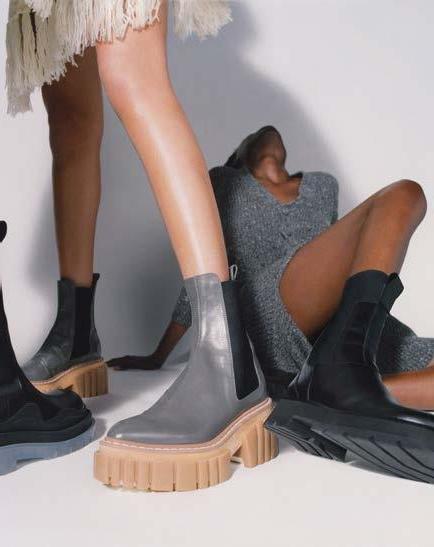
NET-A-PORTER From sturdy utilitarian boots, to sparkly stilettos, Net-a-porter has all of your winter footwear needs covered. Check out their ‘Incredible Shoes’ edit for all of the best styles of the season.
net-a-porter.com
CRAFT WORK

CARV Skilfully handmade by Becky Cocker in a small studio on the North Devon/ Cornwall border, CARV’s minimalist leather goods are created using mindful, slow and sustainable practices including centuries-old hand leatherworking techniques.
carvlondon.com
5 of the best ECO-FRIENDLY KNITS
COS
Lyocell Sweatshirt, £30; cosstores.com
&DAUGHTER
Natural Yarn Sweater, £295; net-a-porter.com
GANNI
Recycled Fibre Cardigan, £195; net-a-porter.com
BAUKJEN
Natural Fibre Jumper, £129; baukjen.com
ARKET
Recycled Cashmere Sweater, £150 arket.com

Brand Focus
LITTLE REF
Eco-friendly brand Reformation launches a mini and me collection of dresses...
With a focus on mindful manufacturing, Reformation has become the place to go for eco-friendly dresses. If you’re a fan of the LA headquartered brand’s feminine designs you’ll be pleased to know that they have recently launched Little Ref, a mini and me capsule collection.
Aimed at making getting dressed in the morning simpler (using the logic that you only have to choose one outfit), designs are miniature versions of dresses from the women’s range. Reformation uses consciously chosen materials such as natural linen or deadstock, repurposed fabrics to create their pieces. They also partner with non-profit group Canopy to ensure their viscose is sourced from sustainably managed forests.
Following feedback from their customers on social media they’ve also expanded their range of sizes for women, launching a petites collection and also an extended sizes collection going up to size 26, as well as a collection designed to fit women with a full C-DD cup.
The collection for little ones includes pu sleeve dresses in comfy silhouettes – perfect for the next generation of eco-conscious girls.

